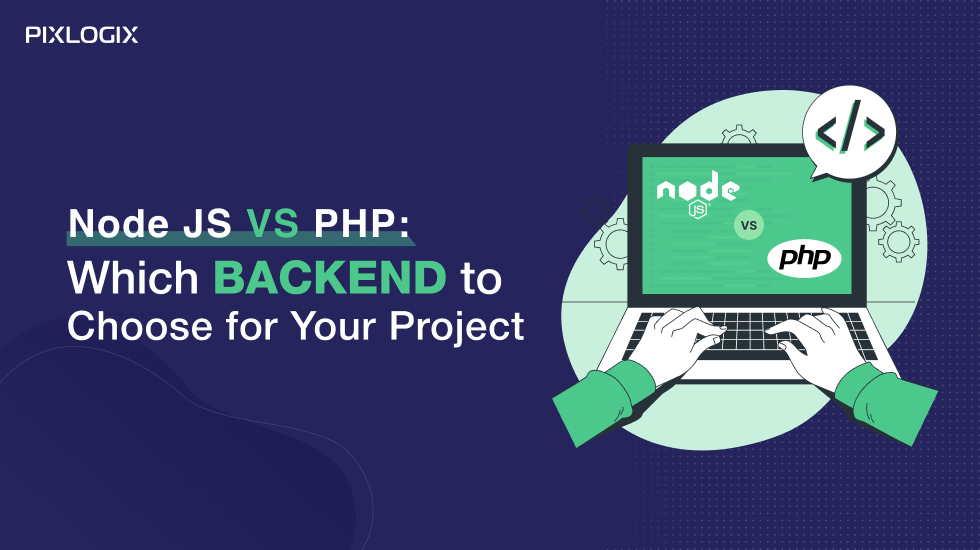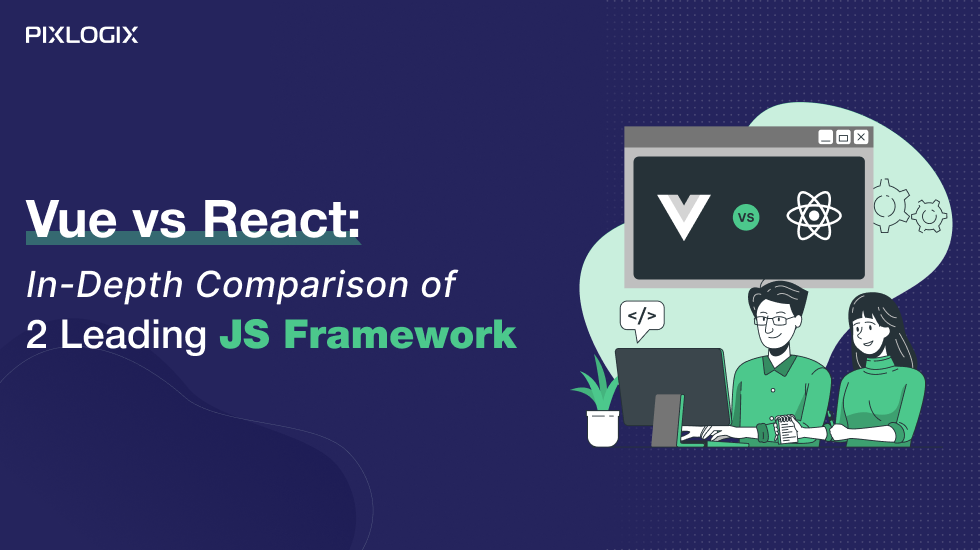Node JS vs PHP: Which Backend to Choose for Your Project

- Last Updated On October 15, 2024
- 17 min read
Choosing the right backend technology is a crucial decision that can significantly impact the success of your project. Whether you’re building a simple website, a complex web application, or an API-driven platform, the backend forms the foundation of your entire digital ecosystem. Two of the most popular options in the web development world are Node js vs PHP. Both have their strengths and unique features, but they cater to different needs and project types.
In this blog, we’ll explore the key differences between Node js vs PHP, helping you understand which technology is best suited for your specific requirements. By the end, you’ll have a clearer idea of whether to go with Node.js for its high performance and scalability or stick with PHP for its ease of use and widespread support.
Let’s dive in and compare these two powerful backend technologies to help you make an informed choice for your next project.
What is Node.js?
Node.js is a technology that helps run web applications on servers. Imagine it as a super-efficient engine that handles requests and sends data back to users.
For example, when you use a chat app, Node.js manages the messages and updates in real-time. It uses JavaScript, a language commonly used in web browsers, but runs on the server instead.
This means developers can write both the front-end and back-end of web applications in the same language, making it easier to build and maintain websites and apps. Node.js is popular for its speed and ability to handle many tasks at once.
3.5% of web server websites use Node.js including some popular websites using node.js Github.com, Netflix.com, Adobe.com, Spotify.com, Vimeo.com, Tiktok.com, and X.com.
What is PHP?
PHP is a scripting language used to create and manage websites. Think of it like a set of instructions that a web server follows to generate web pages. When you visit a website, PHP helps to pull information from a database, process it, and display it on the page you see. It’s especially good for creating interactive features, like user logins and forms.
For example, when you log into your email account, PHP helps manage that process in the background. It works behind the scenes, so you don’t see it directly, but it’s crucial for many websites to function smoothly. With the dominating figure of 75.9% of all the websites whose server-side programming language we know, use PHP. Such as Microsoft.com, Facebook.com, Wikipedia.org, WordPress.org, and Vimeo.com.
Node.js vs PHP: Overview
Before making any judgment between Node.js and PHP, it is important to know about them.
Node.js and PHP are both programming languages used to build websites and apps, but they work in different ways:
- Node.js: Built using JavaScript, it’s known for its speed and ability to handle many tasks at the same time. Developers use Node.js for things like real-time apps (think chat apps or online games) because it’s fast and responsive.
- PHP: PHP has been around longer and is commonly used for websites like blogs, forums, or e-commerce sites. It works well with databases, making it great for handling forms and storing data.
Both are popular, but Node.js is preferred for modern, fast applications, while PHP remains reliable for more traditional websites.
Node js vs PHP: A Quick Comaprison Table
| Aspect | Node.js | PHP | Winner |
|---|---|---|---|
| Language Type | JavaScript (server-side) | Server-side scripting language | Tie (depends on preference) |
| Performance | Fast, non-blocking I/O | Improved performance in recent versions, but generally slower than Node.js | Node.js |
| Scalability | Excellent for real-time, scalable applications | Good for traditional web applications, but less scalable for real-time apps | Node.js |
| Learning Curve | Steeper for beginners, easier for those familiar with JavaScript | Easier for beginners, widely taught | PHP |
| Community Support | Large, active community | Very large, mature community | Tie |
| Package Management | npm (largest package ecosystem) | Composer (growing, but smaller than npm) | Node.js |
| Framework Availability | Express.js, Nest.js, Meteor | Laravel, Symfony, CodeIgniter | Tie |
| Database Support | Excellent with NoSQL (e.g., MongoDB), good with SQL | Excellent with SQL, good with NoSQL | Tie |
| Hosting Options | Many options, some specializing in Node.js | Widely supported, often cheaper | PHP |
| Use Cases | Real-time applications, APIs, microservices | Content management systems, traditional websites | Depends on project |
| Job Market (2024) | High demand, growing | Stable demand, widely used | Node.js (for growth) |
| Corporate Backing | Supported by OpenJS Foundation | Supported by PHP Foundation | Tie |
| Latest Version (2024) | Node.js 20.x (LTS) | PHP 8.3 | Tie |
| Development Speed | Fast for experienced developers | Fast, especially with modern frameworks | Tie |
| Cross-platform Support | Excellent | Good, but less native | Node.js |
| Asynchronous Programming | Built-in, core feature | Possible, but not as seamless | Node.js |
| Security | Good, requires careful configuration | Good, mature security practices | Tie |
| Enterprise Adoption | Growing rapidly | Well-established | PHP (for now) |
| Mobile App Development | Suitable with frameworks like React Native | Less common, but possible with frameworks like PhoneGap | Node.js |
Let’s read detailed comparing Node JS vs PHP
Choosing between Node.js and PHP for your project depends on various factors, including your project requirements, team expertise, and long-term goals. Below is a comparison of both technologies to help you make an informed decision:
#1. Performance
Node.js: Built on Chrome’s V8 JavaScript engine, Node.js is non-blocking and event-driven, which makes it highly efficient for handling multiple connections simultaneously. It is particularly strong in real-time applications like chat apps, gaming, and collaboration tools.
PHP: PHP is a synchronous, blocking language, which can lead to slower performance for I/O-heavy applications. However, PHP has seen improvements in performance with versions 7. x and 8. x, making it still suitable for many web applications.
#2. Learning Curve
Node.js: If your team is already familiar with JavaScript, learning Node.js will be straightforward. However, understanding asynchronous programming, which is central to Node.js, can be challenging for those new to it.
PHP: PHP is known for its ease of use and simple learning curve. It’s well-documented, and many learning resources are available, making it accessible even to beginners.
#3. Ecosystem and Libraries
Node.js: NPM AKA Node Package Manager has a massive repository of libraries and tools, making extending your application’s functionality easy. Node.js is also popular for full-stack development with frameworks like Express.js and integrating with frontend frameworks like React or Angular.
PHP: PHP has a mature ecosystem with frameworks like Laravel, Symfony, and CodeIgniter. These frameworks simplify web development and come with built-in features for security, routing, and database management.
#4. Community and Support
Node.js: Node.js has a large, active community with frequent updates and new libraries. However, since it’s relatively newer, some libraries may not be as stable or well-maintained.
PHP: PHP has been around for decades, resulting in a robust community and extensive support. It’s also used by popular content management systems like WordPress, Joomla, and Drupal, which contributes to its widespread usage.
#5. Scalability
Node.js: Node.js excels in building scalable network applications due to its non-blocking I/O model, making it ideal for microservices architecture.
PHP: PHP can be scaled, but it’s often more complex and may require more resources compared to Node.js. For large-scale applications, scaling PHP might involve additional considerations like load balancing and caching.
#6. Hosting
Node.js: Node.js hosting options are growing, with many providers now offering support. However, it’s not as universally supported as PHP.
PHP: PHP has universal support across almost all hosting providers, making deploying PHP applications on a wide range of platforms easy.
#7. Use Cases
Node.js: Best suited for real-time applications, single-page applications (SPAs), streaming services, and API development.
PHP: Ideal for traditional server-side web applications, content management systems, eCommerce platforms, and blog sites.
#8. Cost
Node.js: Generally, Node.js projects may require more initial investment in development time and resources, particularly if the team is not experienced with JavaScript.
PHP: PHP development can be more cost-effective, especially for smaller projects or if you’re using CMS platforms like WordPress, which have low-cost hosting and wide availability of plugins.
Vertic
Choose Node.js if your project demands high performance, real-time communication, and scalability, especially if your team is comfortable with JavaScript.
Choose PHP if you’re building a content-heavy website, need something up and running quickly, or want a tried-and-true solution with extensive hosting and CMS options.
FAQ: Node js vs. PHP
Q 1. How does Node.js differ from PHP?
Node.js is a JavaScript runtime built on Chrome’s V8 engine that allows you to execute JavaScript on the server side. It’s non-blocking and event-driven, making it ideal for real-time applications. PHP is a server-side scripting language designed for web development, known for its simplicity and wide adoption in content management systems like WordPress.
Q 2. Which is better for performance: Node.js or PHP?
Node.js generally offers better performance for I/O-heavy tasks due to its non-blocking architecture. It’s ideal for real-time applications and APIs. PHP has improved performance with recent versions but may not match Node.js in scenarios requiring handling multiple concurrent connections.
Q 3. Is Node.js more difficult to learn than PHP?
If you’re familiar with JavaScript, learning Node.js can be straightforward. However, mastering its asynchronous programming model may require additional effort. PHP is known for its ease of use and low learning curve, making it accessible to beginners.
Q 4. Which backend platform has a better ecosystem: Node.js or PHP?
Node.js has a vast and rapidly growing ecosystem with NPM, offering numerous libraries and modules for development. PHP also has a mature ecosystem, especially with frameworks like Laravel and Symfony, which are widely used for web development.
Q 5. Can I use Node.js for traditional web applications, or is it only for real-time apps?
While Node.js is known for its strengths in real-time and event-driven applications, it can also be used to build traditional web applications. Frameworks like Express.js make it easy to develop server-side applications, including traditional web apps.
Q 6. Is PHP still relevant in this modern web development?
Absolutely. PHP powers a significant portion of the web, including popular CMS platforms like WordPress, Joomla, and Drupal. It’s still a go-to choice for many developers, especially for content-driven websites and eCommerce platforms.
Q 7. Which is more scalable: Node.js or PHP?
Node.js is generally considered more scalable, especially for applications that require handling many concurrent connections. PHP can also be scaled but may require more resources and careful architectural planning, particularly for large-scale applications.
Q 8. What are the hosting options for Node.js and PHP?
PHP is supported by almost all hosting providers, making it easy to find affordable and reliable hosting. Node.js hosting options are growing, but they may not be as universally available as PHP, though many cloud providers now offer Node.js support.
Q 9. Should I choose Node.js or PHP for my next project?
The selection between Node.js and PHP totally depends on the specific needs of the project. If you need high performance, scalability, and real-time capabilities, Node.js might be the better option. PHP could be the way to go if you’re looking for simplicity, ease of deployment, and compatibility with existing CMS platforms.
Q 10. Can we use Node.js and PHP in the same project?
Yes! It’s absolutely fine to use Node.js and PHP in the same project. You can use both depending on your requirements. For example, you might use PHP for your CMS and Node.js for real-time features like chat or notifications. Integration between the two is feasible with APIs and microservices.
Samir Bhimbha
Samir Bhimbha is the Founder & CEO of Pixlogix Infotech Pvt. Ltd. which offers web and app solutions to fulfill business's online needs and help to improve their online presence with many clients in the USA, Europe, Australia, and more. He is a skilled entrepreneur, web designer, developer, and team leader who can handle every situation. With 15+ years of experience in UX/UI design and web development, he is leading a team of IT professional talents.
Related Post
Get in Touch Now!
Have a word with our expert consultants about your next project to get suggestive guidance & proposal.
Sales Inquiry
Chat with us about your project for a custom solution and quote.











